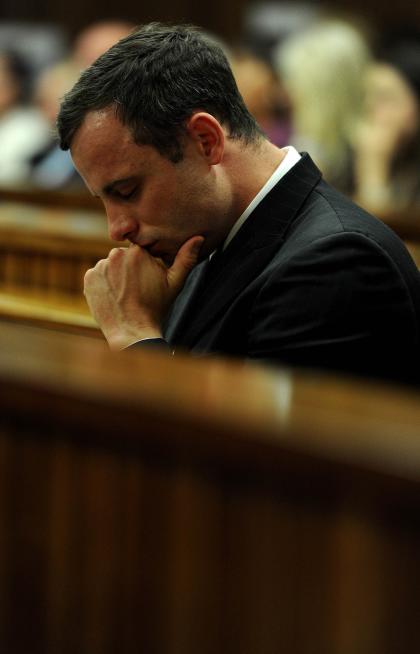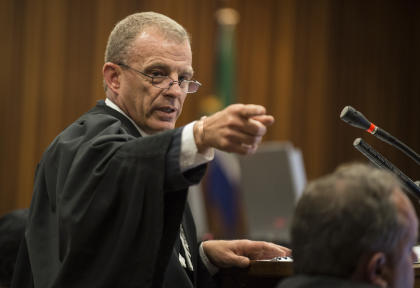Oscar Pistorius Trial Day 40: Prosecutor says athletes' account 'devoid of any truth' during closing arguments
PRETORIA, South Africa – Prosecutor Gerrie Nel labeled murder-accused Oscar Pistorius "deceitful" and an "appalling witness" while making his case for a life sentence during Thursday's closing arguments.
The prosecution said, regardless of who the Paralympian meant to shoot through his toilet door on Feb. 14 last year, he is guilty of premeditated murder. The star athlete is on trial for the shooting death of his girlfriend Reeva Steenkamp in the pre-dawn hours of Valentine's Day.
"The court, with respect, must fully reject his version," Nel declared.

Pistorius fidgeted in the dock between stifling yawns, appearing to shed a brief tear only when several of Steenkamp's WhatsApp messages were read out in court. His estranged father Henke – making his first appearance in Courtroom GD since the beginning of his son's murder trial – watched emotionless from the family bench.
On the other end of the crammed public gallery, Steenkamp's father Barry, spent his first day at the trial of the man who shot his daughter, clutching his wife June.
A deceitful witness, 'victim of circumstance'
"Bull Terrier" prosecutor Nel, nicknamed for his unrelenting style of interrogation, told the court Pistorius was an "appalling witness," "demonstrably one of the worst witnesses we have ever encountered."
"The accused was more concerned about 'defending for his life' than entrusting the court with a truthful account of his conduct on that fateful morning," Nel said, with a tinge of contempt.
On the stand, Pistorius' testimony was vague, his responses argumentative, the prosecutor told Judge Thokozile Masipa and said Pistorius' apparent patchy recollections of various events demonstrated mendacity, a tendency to lie.
Hammering at the Paralympian's character, Nel described the murder-accused as "deceitful."
Painting a picture of a young man evading any responsibility and trying to shift blame, the state listed Pistorius' reaction to his firearms charges as evidence – insisting the reckless discharge of guns on two occasions was the fault of others and blaming his father for leaving him in the illegal possession of ammunition.
"He is always the victim of circumstance," Nel told the judge, eyebrows raised. "His version is not only not reasonably possibly true, but absolutely devoid of any truth."

Highlighting Pistorius' own admission that his testimony was a combination of what he could remember and a reconstruction based on what he had read in evidence, "should be a warning sign that his evidence should be approached with circumspection," Nel insisted.
Nel's incredulity didn't stop there. When pressed on the stand, Pistorius resorted to the "very unconvincing but predictable response, 'I am tired,' " the prosecutor said.
"He in fact tailored his evidence, and used well-calculated and rehearsed emotional outbursts to deflect the attention and to avoid having to answer questions," the state's written arguments read.
The stout prosecutor somewhat gleefully dropped an athletic analogy into his argument.
"The accused … had the opportunity to run with the baton of truth," Nel told the judge. "The State will expose how he stumbled over his lies and deceit and in the process was unable to complete the race."
A snowball of lies
The state says the objective facts – the backbone of the case's circumstantial evidence – forms a "gruesome mosaic", which Pistorius had to keep remodeling, by constantly adapting his testimony.
Running through a list of "significant incongruities" in the Paralympian's account of events, Nel alleged that Pistorius' seemingly shifting memory was really a set of lies, built one on the next out of necessity, a growing snowball of deceit.
The prosecution says Pistorius had to "create the time" for Steenkamp to go unnoticed to the bathroom, and so he supplemented the fan in his bail affidavit with another fan, carrying them a greater distance. Asked where he placed them, the murder-accused described a place on the floor, which was in police photographs of the scene, covered by his bedspread.
So then, "he had to create a version about the duvet," Nel explained, adding that Pistorius then accused police of having moved the fans, the bedspread and the curtains, disturbing the scene before they took photographs.
"A farce," Nel said.
And when Pistorius insisted the duvet was on the bed, where he had left it, he opened himself up to a series of contradictions: If he could see the bedspread, he should have been able to see Steenkamp's location, Nel pointed out triumphantly.
"A domino effect," the prosecutor told the court.
Pistorius also described a conversation with Steenkamp upon waking in his testimony on the stand – an addition to his initial bail affidavit – Nel said, something that would be "inconceivable" for him not to mention earlier, if true.
Then Bull Terrier asked the question most publicly speculated about: Why didn't Pistorius check on Steenkamp when he heard a noise?
"It is our respectful argument that normal human behavior dictates that one will discuss a disturbing sound with one's partner especially if one is intent on protecting that person," the prosecution's written arguments read. "You would at least look at the person and ensure that she is safe."
Why didn't Steenkamp respond to her boyfriend when he was shouting at a perceived intruder, Nel asked, "And if she was scared of an intruder, why was she standing when she was shot, instead of cowering in fear?"
If Pistorius' defense fails to convince the judge that all the details of his testimony are plausible, the court must reject his entire version, Nel said.
"If the accused's elaborate false version is rejected, the court will have no option but to accept that the accused knew the deceased was in the toilet and fired four shots with dolus [intent] directus to kill her," he read from the state's written submissions.
Experts and witnesses
Emphasizing the impressive demeanor of his witnesses, and contemptuously denouncing the defense's experts, Nel insisted the testimony of the state's star witnesses – neighbors who allegedly heard a woman's "terrified, bloodcurdling screams" – was credible.
If Pistorius' screams truly sound like those of a woman, why were recordings not played to the witnesses? Nel asked.
Regardless, neighbors heard female screams intermingled with a man's voice, the prosecutor said, thereby rendering any suggestion that Pistorius' cries could sound like those of a woman, irrelevant.
"And it is significant that the accused screamed whilst breaking down the door but not thereafter," Nel told the court. "If you see your loved one lying in a pool of blood and you screamed before, then you would scream more than ever."
The state makes much of forensic pathologist Gert Saayman's finding that Steenkamp was likely to have eaten much closer to her time of death than Pistorius' account suggests. Nel argued that it tallies with neighbor's testimony of having heard a woman's voice "like arguing" at 1:56 a.m., leading to the inference that Steenkamp was awake and in the kitchen, with the security alarm deactivated.
More evidence that "destroys the accused's version of the loving couple going to bed at approximately [10] o'clock," Nel said.
In his response, defense attorney Barry Roux differentiated between "reliability" and "credibility," suggesting that it is possible for witnesses to genuinely believe incorrect information. It is a line of argument he is expected to expand on in the defense's detailed arguments.
But even if he thought there was an intruder, it's murder
The prosecution, in its closing arguments, has presented the judge with several options. Ultimately, it is pushing for a charge of pre-meditated murder, which carries a mandatory life sentence.
If the judge and her two assessors believe that Pistorius knew Steenkamp was in the toilet and fired, it represents a form of dolus directus intent: He wanted to kill her, and did.
But, the state is arguing, if they believe the athlete thought an intruder was in his bathroom, it could still be pre-meditated murder: He retrieved his gun, unholstered it, disengaged the safety, approached the cubicle more than five meters away, took a position and shot four times with a tight grouping of shots.

"I know there is a human being behind that door," Nel said of Pistorius' intent, "I mean to kill that person and I do so. That it turned out to be Reeva is [legally] of no consequence."
And if Judge Masipa decides there was no pre-meditation, the situation still demonstrates dolus eventualis (understood his actions could cause someone's death) on Pistorius' part, Nel argued.
"He fired four shots into a small toilet cubicle and must have foreseen that he will hit and kill the person inside the toilet with 9mm Black Talon ammunition," Nel said. "He reconciled with this realization and went ahead. He proceeded to fire not one, but four shots."
If Pistorius could foresee his actions could cause death, and recklessly proceeded anyway, South African law considers it murder, which carries a minimum 15-year prison sentence.
"There's cognitive function," Nel told the judge, "It's a deliberate action."
As for Pistorius' "putative self-defense" strategy, "A court will not entertain a version by an accused that he deliberately places himself in danger and then acts in self defense," Nel said.
The double amputee dealt with his vulnerability by arming himself, Nel told the court.
Defense fights back
After hours of sucking on his spectacles and listening to his counterpart's rhetoric, Roux emerged on the attack.
The defense attorney accused the state of ignoring a "serious material objective fact": the first "bangs" witnesses heard. During the trial, Nel unequivocally told the court it was the prosecution's version that the second "bangs" were the gunshots.
"Nowhere does the state tell us what the first sounds or shots were," Roux emphatically declared.
"He had to move the shots," Roux said, suggesting Nel's hand was forced after the testimony of the first few witnesses, when he realized Steenkamp wouldn't have been able to scream after receiving her injuries – rendering his witnesses incredible, if he maintained that the first set of bangs were the gunshots.
The defense has also accused the state of purposefully leaving out particular affidavits, and certain witnesses – like former investigating officer Hilton Botha, who Roux thoroughly discredited during the bail hearing. "He told blatant lies," Roux told the judge.
"I'm not saying there was a conspiracy, but police disturbed the scene," Roux insisted, pointing out that to walk onto the balcony, officers would have had to move objects. The defense is implying police incompetence is to blame, rather than Pistorius, for the seeming improbabilities in his testimony.
Closing arguments continue Friday with defense attorney Roux, after which the judge will set a date to deliver her verdict.

 Yahoo Sports
Yahoo Sports 
